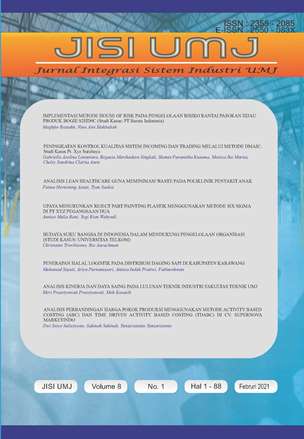PENERAPAN HALAL LOGISTIK PADA DISTRIBUSI DAGING SAPI DI KABUPATEN KARAWANG
DOI:
https://doi.org/10.24853/jisi.8.1.55-65Keywords:
Halal, Logistik halal, Distribusi, Rumah Potong Hewan.Abstract
Indonesia merupakan “Largest Halal Market” di dunia. Tidak berlebihan bila kita melihat bagaimana umat muslim merupakan mayoritas di negara ini. Sebaran umat muslim dari Sabang sampai Merauke sangat besar. Khususnya umat muslim terpadat ada di Pulau Jawa termasuk Karawang didalamnya menjadi sebaran masyarakat muslim yang padat. Untuk itu diperlukan sertifikasi halal guna memberikan rasa aman dan nyaman terhadap pelanggan yang sebagian umat muslim. Namun faktanya, Semua Rumah Potong Hewan milik pemerintah Kabupaten Karawang belum mempunyai sertifikasi halal dari Majelis Ulama Indonesia. Namun praktik pemotongan hewan sudah halal. Hal tersebut berdasarkan basic standarisasi penyembelihan hewan menurut Majelis Ulama Indonesia sudah dilaksanakan dengan baik. Alur Distribusi Rumah Potong Hewan sudah bagus. Daging sapi dipisahkan dari produk- produk non halal, lalu dihindarkan dari kontak langsung dengan lantai dan permukaan kendaraan. Dalam pengiriman juga dipastikan tidak terkena air hujan dan debu dengan menutup daging dengan kain terpal. Meski disini belum sesuai standard karena tidak mencantumkan informasi kehalalan dalam proses pengiriman, setidaknya handling product yang dilakukan pihak Rumah Potong Hewan menunjukan usaha yang baik. Hasil”dari Penelitian ini adalah’berupa checklist”yang digunakan sebagai’standard yang harus di terapkan di Rumah Potong Hewan khususnya Pemerintah Kabupaten Karawang.References
Ab”Thalib M.S., (2017) Motivations”and benefits”of halal food safety certification. Journal”of”Islamic”marketing.”
Ceria Farela (2015)”Optimamization of Distribution Flow and Material Allocation with Linear Programming Method. Jurusan Teknik Industri universitas Brawijaya”: Malang”
Gillani,S.H.,Ijaz.F.,&Khan.,MM. (2016). Role”of”Islamic”Financial”Institutions in Promotion”of”Pakistan Halal Food Industry. Islamic banking And Finance Review, ”3 (1), 29-49
Hasmand Zusi. 2014. ”Operation Research : ”Konsep”dan”LangkahPenyelesaian Soal.”Jakarta. ”Penerbit”Universitas”Trisakti
Ilyas”Masudin,”Gilang”Yandeza.”2018.”LinearProgramming dengan R (Aplikasi untuk Teknik Industri). ”Malang.”Penerbit”UMM”Press
LPPOM, M. (2012).”Halal”Assurance”System 23000 Series. LPPOM”MUI, Jakarta
Mahendrawathi., ”Er., ST.,M.Sc., Ph.D, Prof., Ir., ”I”Nyoman Pujawan, ”M.Eng, Ph.D. 2017. ”Supply”Chain”Management”Edisi”3. ”Yogyakarta. Penerbit”ANDI
Mohd”Hafiz”Zulfakar, Caroline”Chan, Ferry”Jie (2018). ”Institutional”forces”on Australian”Halal”Meat”Supply”Chain” (AHMSC) operations. Journal of”Islamic”Marketing”
Mulyani”S.”(2014).”Riset”Operasional.”LPEM,”Universitas”Indonesia:”Depok
Nasional, ”B.S. (1999).”Standar”Nasional”Indonesia (SNI)”01-6159-1999”Rumah ”Potong”Hewan”
Nomor, U.U. (9)”Tahun 1999”tentang”Perlindungan”Konsumen
Nomor,”U.U. (33)”Tahun”2014”tentang”Jaminan”Produk”Halal. Informasi, Pengetahuan, ”Teknologi
Noordin.N.,”Noor.N.L.M.,”Samicho., (2014). ”Strategic”Approach”to”halal certification”System: ”An”Ecosystem”perspective. ”Procedia-Socialand Behavioral”Sciences, ”121, ”79-95”
Siswanto.”(2007).”Operations”Research ” (Jilid 1 ).”Jakarta.”Penerbit”Erlangga
Sri Bastiari (2018) ”Integer”Linear”Programming”Dengan”Pendekatan”Metode Cutting”Plane dan Branch and Bound untuk optimasi produk tahu. Jurusan Matematika dan Sains. Universitas Islam Negeri Sultan Syarif Kashim : Riau
Soon, J.M., ”Chandia,”M.,”&”Regenstein”J.M (2017)”Halal”Integrity”in”Halal Food”Supply”Chain.”British”Food”Journal,”119 (1),”39-51
Sugiyono. 2011. Metode Penelitian Kombinasi. Yogyakarta. Penerbit Alfabeta
Tieman,”M. (2008)”Halal”Storage:”a”Critical”Succes”factor”of”your”halal”supply chain.”Halal”Journal, ”11”
Tieman,”M. (2013)”Establishing”the”Principles in halal logistic. Journal of Emerging Economies”and”Islamics”Research” (JEEIR),”1(1).”pp 1-13
Tieman, M.”Van der Vorst.”Maznah”Che”Ghazali. (2012)”Principles”in”Halal Supply”Chain”Management.”Journal”of”Islamic”Marketing,”Vol”3, ”Issue: ”3, ”pp. ”217-243”
Tieman, M. (2011). ”The”Application”of”Halal”in”Supply”Chain”Management: ”in-depth interviews.”Journal”of”Islamic”Marketing,”Vol”2,”Issue:”2,”pp. 186-195”
Togar, ”M, ”Simatupang. (2016). ”A”Simulation”of”Contract”Farming”Using”Agent Based Modelling, Journal”of”Operations”and”Supply”Chain” Management, ”Vol”9,”Issue:”2,”pp:”28-48”
Ujang”Maman,”Akhmad”Mahbubi,”Ferrie”Jie.”(2017).”Journal”of”Islamic”Marketing”Halal”Risk”mitigation”in”the Australian- Indonesian Red Meat”supply”Chain. ”
Yolanda”M”Siagian. (2005)”Aplikasi Supply”Chain”Management”dalam”dunia bisnis. ”Jakarta. ”Penerbit”Grasindo”
Zulfakar,”M.H., Jie, F., & Chan, C (2014)”Halal”Food Supply Chain Integrity: From”Literature”Review to”a”Conceptual Framework. 10th ANZAM Operation,”Supply Chain”and Services”Management Symposium” (PP 1-23).”Melbourne: ”Australia
Downloads
Published
Issue
Section
License
COPYRIGHT POLICY
The author(s) of an article published in the JISI UMJ retains ownership of the intellectual property rights in work (s).
PUBLISHING RIGHTS
The author(s) of an article published in the JISI UMJ have unrestricted publication rights. The authors give the JISI UMJ the right to publish the article and designate the Industrial of Engineering Universitas Muhammadiyah Jakarta Publishing as the original publisher of the article.
LICENSING POLICY
Journal of Industrial Engineering and Sciences is an open-access journal that follows the Creative Commons Non-Commercial 4.0 International License (CC BY-NC 4.0), which states that:

Under this license, the reusers must give appropriate credit, provide a link to the license, and indicate if changes were made. Users may do so in any reasonable manner, but not in any way that suggests the licensor endorses users or their use.
Please take the time to read the whole license agreement (https://creativecommons.org/licenses/by-nc/4.0/). As long as reusers follow the license conditions, the owner cannot withdraw these freedoms. The following components are included under this license:
 Attribution: Users must provide appropriate attribution, including a link to the license, and indicate whether or not they made any modifications. Users are free to do so reasonably, but not in a manner that indicates the licensee approves of their usage.
Attribution: Users must provide appropriate attribution, including a link to the license, and indicate whether or not they made any modifications. Users are free to do so reasonably, but not in a manner that indicates the licensee approves of their usage.
 NonCommercial: Users may not use the material for commercial purposes.
NonCommercial: Users may not use the material for commercial purposes.





